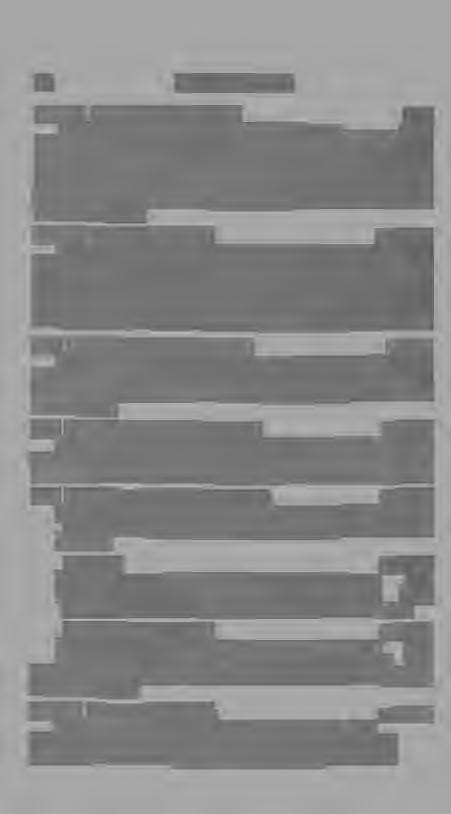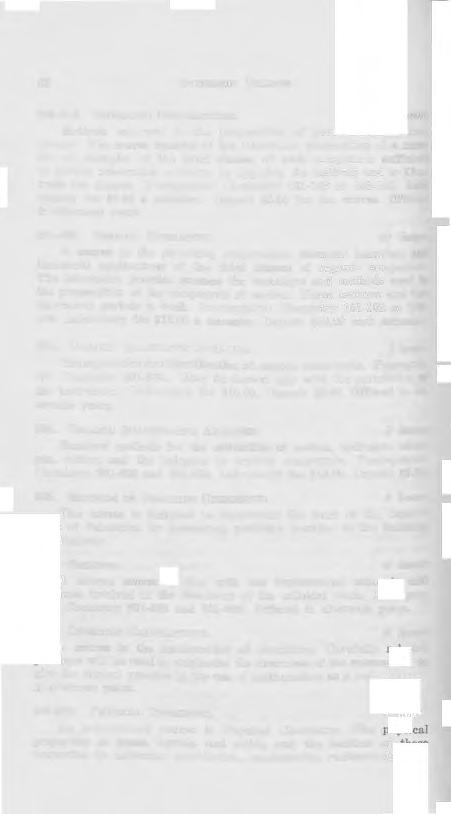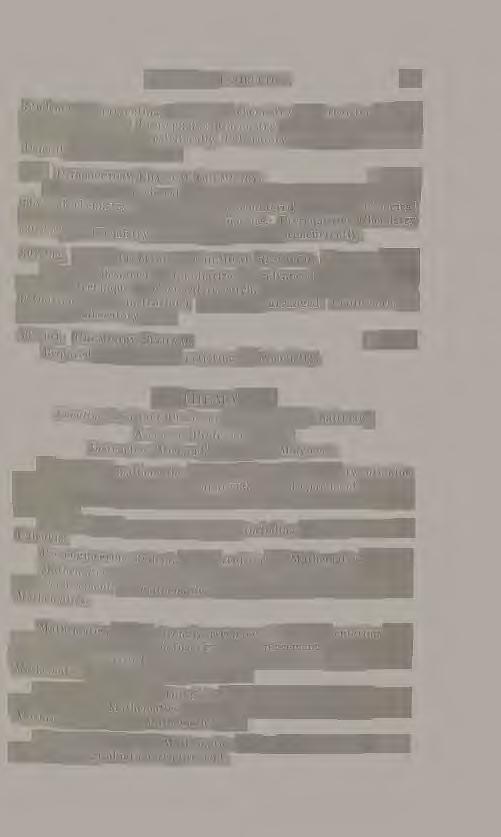
5 minute read
Mathematics
COURSES OF INSTRUCTION 81
CHEMISTRY
Faculty: Professor Michael, Chairman; Professor Esselstyn; Associate Professor Crane; Assistant Professor Turley.
A student choosing chemistry as a major will be required to complete courses in General Chemistry, Analytical Chemistry, and Organic Chemistry; other courses in Chemistry together with courses in Mathematics, Physics or Biology may be required as the needs of the student indicate.
A minor shall consist of fifteen hours.
101-102. GENERAL CHEMISTRY. 8 hours
For students who do not present hlgh school chemistry for entrance. Not open to junio1·s and seniors. A thorough course in the fundamentals of chemistry laying the foundation for the future work of those who intend to follow chemistry as a profession and those who will use it in medicine, home economics, engineering, etc. Elementary qualitative analysis is included in the second semester. Three recitations and two laboratory periods each week. Laboratory fee $10.00 a semester. Deposit $5.00 for the course.
103-104. GENERAL CHEMISTRY. 8 hours
For students who have had high school chemistry. Content of this course is similar to 101-102 and includes qualitative analysis in the second semester. Two recitations and two laboratory periods each week. Laboratory fee, $10.00 a semester. Deposit $5.00 for the course.

201-202. QUANTITATIVE ANALYSIS. 8 hours . An effort is made to give the student a foundation in the principles of chemical analysis, to provide practice in analytical procedures and calculations, and to develop a long range view of the nature and application of analytical methods. Prerequisite: Chemistry 101102 or 103-104. Nine to twelve hours in laboratory and one lecture a week. Laboratory fee, $12.00 a semester. Deposit $10.00 each semester.
205. ORGAN1C CHEMISTRY. 4 ho1,rs
A short course in the fundamentals of organic chemistry. Three lectures and one labo1·atory period. Prerequisite: Chemistry 101-102 or 103-104. Laboratory fee $7.50. Deposit $5.00.
20G. BIOCHEMISTRY. 4 hours
A brief course in fundamentals. Three lectures and one laboratory period. Laboratory fee $7.50. Deposit $5.00.
207-208. ADVANCED INORGANIC CHEMISTRY. 4 hours
An advanced course with emphasis on typical classes of inorganic compounds. Prerequisite: Chemistry 101-102 or 103-104. Offered in alternate years.


82
OTTERBEIN COLLEGE
200-210. INORGANIC PREPARATIONS. 4 hour,
Methods employed in the preparation of pure inorganic compounds. The course consists of the laboratory preparation of a number of examples of the chief classes of such compounds sufficient to develop reasonable technique in applying the methods and to illustrate the classes. Prerequisite: Chemistry 101-102 or 103-104. Laboratory fee $7.50 a semester. Deposit $5.00 for the course. Offered in alternate years.
301-302. ORGA(';lC CHE:\IISTRY. 10 hours A course in the structure, preparation, chemical behavior, and industrial applications of the chief classes of organic compounds. The laboratory practice stresses the technique and methods used in the preparation of the compounds of carbon. Three lectures and two laboratory periods a week. Prerequisite: Chemistry 101-102 or 103104. Laboratory fee $12.00 a semester. Deposit $10.00 each semester.
303. ORGANIC QUALITATIVE ANALYSIS. 8 hours
The separation and identification of organic compounds. Prerequisite: Chemistry 301-302. (May be elected only with the permission of the instructor.) Laboratory fee $10.00. Deposit $5.00. Offered in alternate years.
304. ORGANIC QUANTITATIVE ANALYSIS. 2 hours
Standard methods for the estimation of carbon, hydro~en, nitrogen, sulfur, and the halogens in organic compounds. Prerequisite: Chemistry 201-202 and 301-302. Laboratory fee $10.00. Deposit $5.00.
305. METIIODS IN TF.ACBING CHEMISTRY. 2 hours
This course is designed to supplement the work of the Department of Education by presenting problems peculiar to the teaching of chemistry.
306. CoLLOIDS. 2 hours
A lecture course dealing with the fundamental concepts and problems involved in the chemistry of the colloidal state. Prerequis· ites: Chemistry 201-202 and 301-302. Offered in alternate years.
307. CHEMICAL CALCULATIONS. 2 hours
A course in the mathematics of chemistry. Carefully selected problems will be used to emphasize the exactness of the science and to give the student practice in the use of mathematics as a tool. Offered in alternate years.
309-310. PHYSICAL CHEMISTRY. 8 hours An introductory course in Physical Chemistry. The physical properties of gases, liquids, and solids, and the 1·elation of these prope1·ties to molecular constitution, conductivity, radioactivity, etc.
COURSES OF INSTRUCTION 83
Students not presenting a major in chemistry may register for the lecture work only. Prerequisite: Chemistry 201-202 and 301-302 may be taken collaterally. Laboratory fee $10.00 301-302 or a semester. Deposit $5.00 for the course.
311. INTRODUCTORY PHYSICAL CHEMISTRY. S hours
A short course designed to equip students to handle the aspects of physical chemistry which may be encountered in future biological and medical studies. Not open to majors. Prerequisite: Chemistry 301-302; or Chemistry 301-302 may be taken concurrently.
401-402. MINOR PROBLEJIIS IN CUE!\UCAL RESEARCH. ft or more hours
A course designed to familiarize the advanced student with the tools and technique of chemical research. (May be elected only with permission of the instructor.) Fees to be arranged. Conference, library, and laboratory work. 403-404. CHEMISTRY SEMINAR ft hours
Required of all seniors majoring in chemistry.

MA THEMATICS
Faculty: Assistant Professor Wiley, Acting Chairman; Assistant Professor Meyer; Instructors Michaud, Miller and Molyneux.
A major in mathematics consists of not less than twenty-nine seme~ter hours selected with the approval of the Department of Mathematics and must include at least nine hours in the Math. 301. 300 courses except
A minor Calculus. shall consist of 15 hours, including at least 5 hours of
Pre-engineering students should register for Mathematics 121-122.
Mathematics 101, 131 132 139 and 140 may not be used to fulfill any requirement in mathem~tics' in the Division of Science and Mathematics.
Mathematics 101 is strongly recommended for all entering students who show marked deficiency in the placement test in mathematics, and is required of such of these students who expect to take Mathematics 109, 121, 131, 132, 139 or 140.
A student who enters Otterbein without high school plane geometry must take Mathematics 102. If he enters without high school Algebra ]1e must take Mathematics 101.
A student who takes Mathematics 101 or 102 will have 2 hours added to his graduation requirement.











